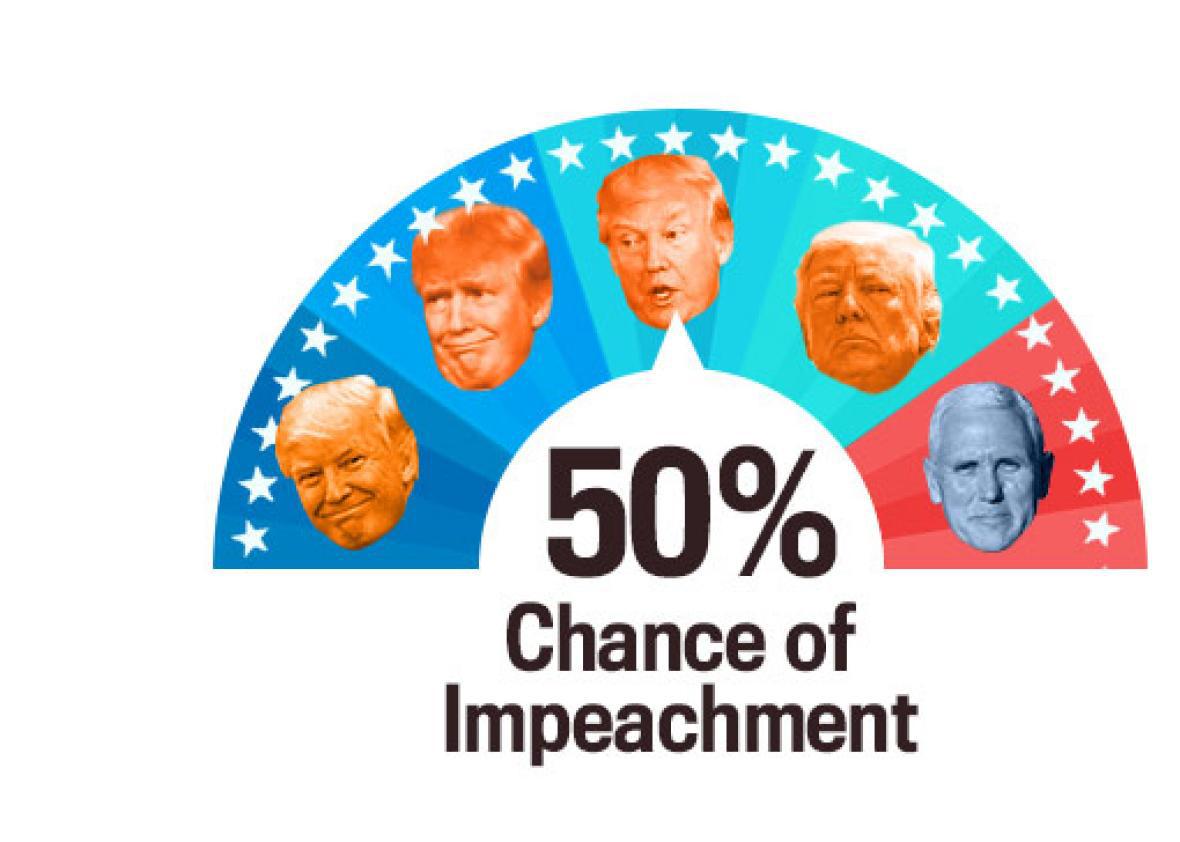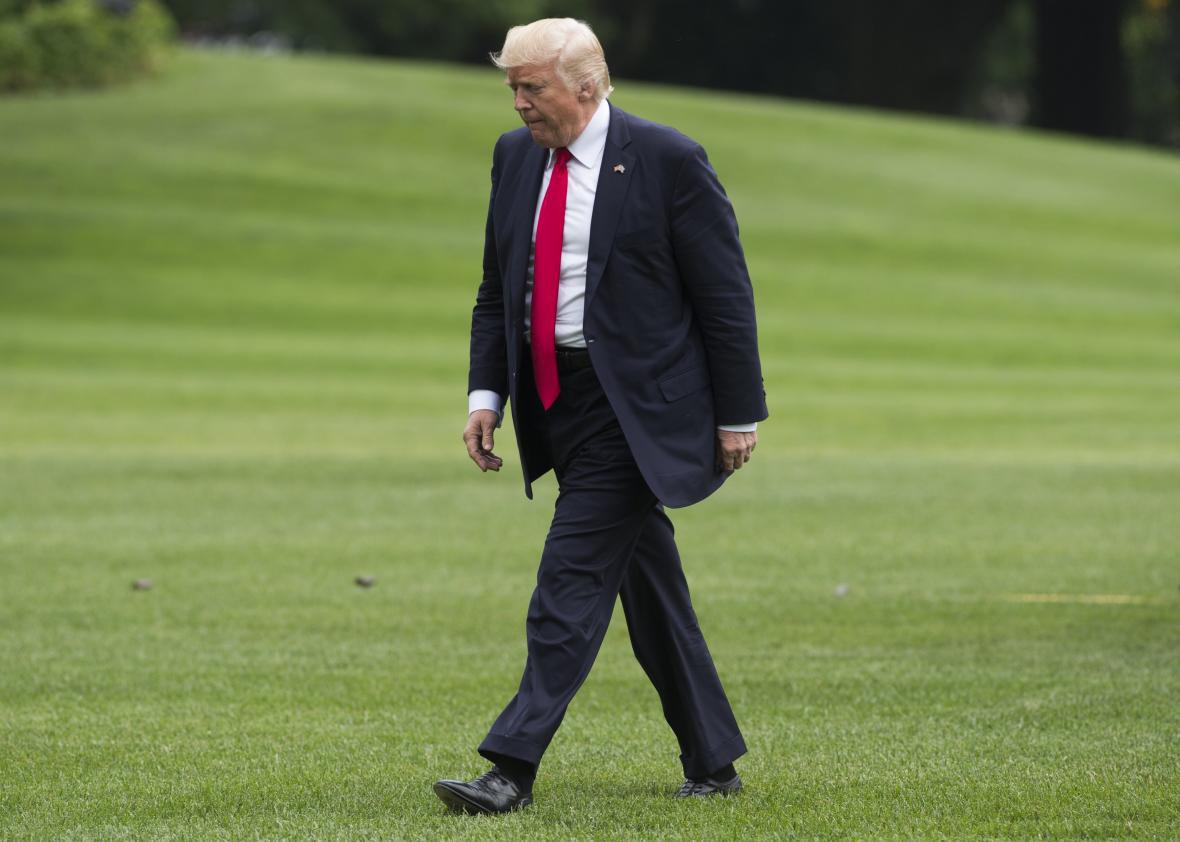In the tradition of the Clintonometer and the Trump Apocalypse Watch, the Impeach-O-Meter is a wildly subjective and speculative daily estimate of the likelihood that Donald Trump leaves office before his term ends, whether by being impeached (and convicted) or by resigning under threat of same.
It’s really hard to keep up with what’s going on in the criminal investigation of President Donald Trump. Developments are basically constant. As of Friday, a number of officials—including Trump’s personal lawyer and a former Trump 2016 communications advisor—had reportedly acquired lawyers of their own. The president meanwhile—who had struggled to find representation from top D.C. lawyers—has apparently found representation from a top D.C. lawyer. Politico reports that Trump’s legal team has retained “John Dowd, who investigated Pete Rose for Major League Baseball and represented John McCain during the Keating Five Scandal, among other high-profile clients.” This could help him! It could also serve as a clamp on any instinct he might have to attempt to subvert (likely further) the Russia and obstruction of justice investigations by attempting to get rid of special counsel Robert Mueller.
All of this comes as Mueller’s investigation proceeds apace, rumors swirl around whether or not deputy attorney general Rod Rosenstein will ultimately have to recuse himself, and as President Trump has begun an apparent personal campaign against Rosenstein and Mueller.
What does it all mean, though? Trump’s tweet on Friday that “I am being investigated for firing the FBI Director by the man who told me to fire the FBI Director! Witch Hunt” can very easily be read as acknowledgement that he is “being investigated for firing the FBI Director by the man who told [him] to fire the FBI Director,” e.g., Rosenstein—who is overseeing Mueller’s investigation. While it’s probably inaccurate to say that Rosenstein told him to fire Comey—Rosenstein testified under oath that he didn’t mean for his memo “to justify a for-cause termination”—this seems to be a basic acknowledgment by the president that he is under investigation. (Fox News reported that a “a source close to POTUS legal team” said it was no such thing. Whatever.)
If Trump is acknowledging he is under investigation for obstruction for justice by Mueller, and if Trump attempts to fire or lean on Mueller, Rosenstein, or anyone else involved in such an investigation, it would seem nearly impossible to argue Trump wasn’t attempting to obstruct an investigation into himself. This seems like a big deal! Before, Trump’s defenders—and even reasonable Trump critics, if only to keep from having to confront impotence in the face of presidential criminality—could justify Trump’s possible obstruction of justice with the argument that he didn’t really obstruct a case into himself and hence wasn’t really doing anything to save his own skin. Now that there is an active investigation of Trump that the president has himself acknowledged, if he tries to put a halt to that investigation, there seems to be no way to deny his motives.
The top Democrat on the Senate Judiciary Committee, Sen. Dianne Feinstein, acknowledged as much in a statement about how destructive that would be to the rule of law. As I argued on Thursday, it would basically be Trump asserting the powers of a dictator, saying that no law enforcement officials—not the top cop in the country and not the former top cop in the country—could look into any potential wrongdoing he may have committed. “The message the president is sending through his tweets is that he believes the rule of law doesn’t apply to him and that anyone who thinks otherwise will be fired,” Feinstein said of the president’s apparent threats against Mueller and Rosenstein. “That’s undemocratic on its face and a blatant violation of the president’s oath of office.”
It could still certainly happen, though! But it appears that if Trump does assert such authority—that he is above the law—Congress would eventually have to act because Americans probably don’t want to give Donald Trump the powers of a dictator. This could be—though it seems unlikely—an impeachment proceeding by Republicans in Congress who might finally flee a sinking ship. Or it could be such proceedings if Democrats take control of Congress in 2018. Or it could happen if and whenever Democrats return to power. Allowing Trump to fire Mueller and end this investigation would be such gross political and legal malpractice that even Democrats would recognize there have to be some legal consequences—whether prosecutions or a truth and reconciliation commission—should that worst-case scenario occur. Until then, impeachment itself is feeling like a coin toss. The meter goes up one point to 50.

Photo illustration by Natalie Matthews-Ramo. Photos by Chip Somodevilla/Getty Images, Win McNamee/Getty Images, Chris Kleponis-Pool/Getty Images, Drew Angerer/Getty Images, and Peter Parks-Pool/Getty Images.
